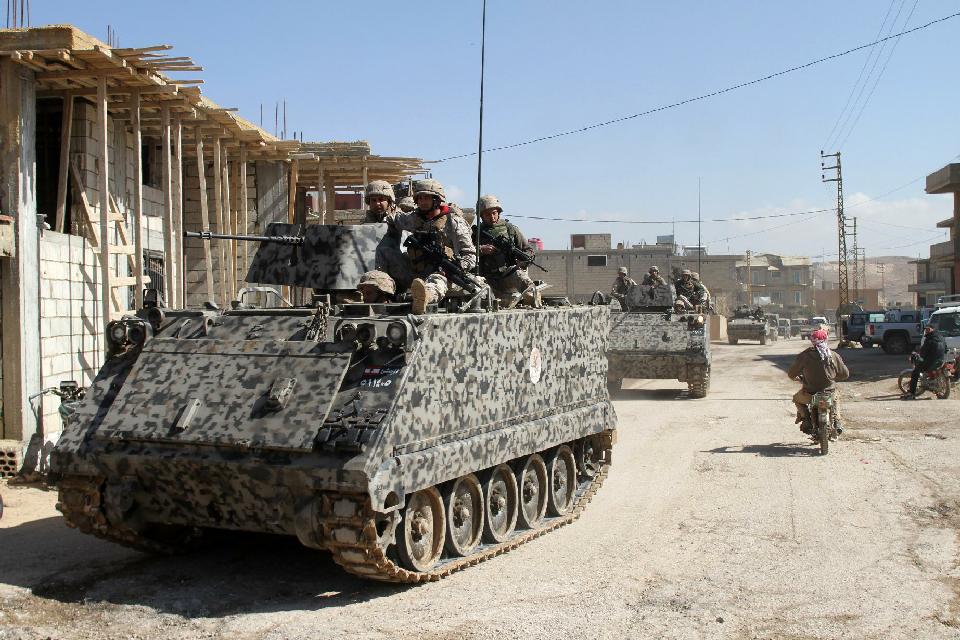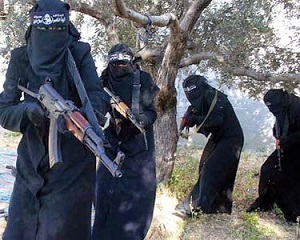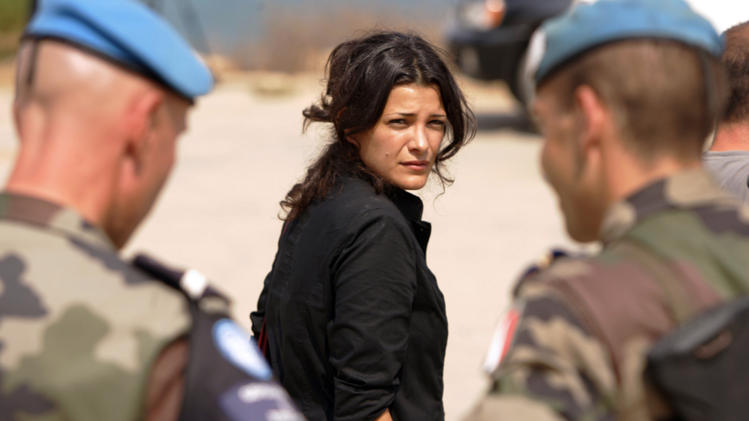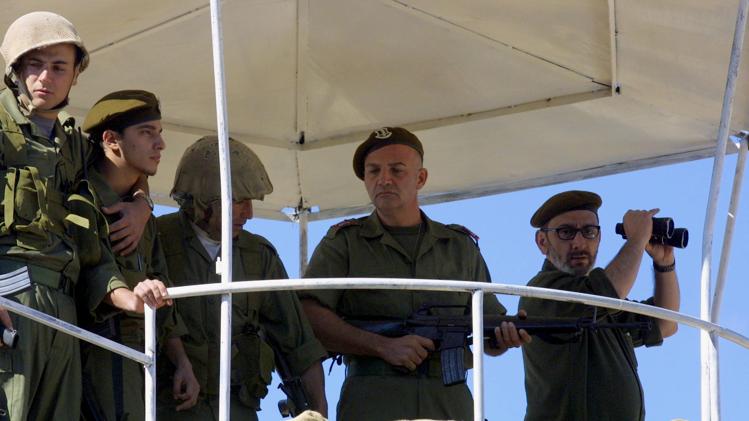The United Nations and the European Union condemned on Monday attacks carried out by Islamist fighters on the Lebanese army in the northeastern border town of Arsal. Acting U.N. Special Coordinator Ross Mountain and EU Ambassador Angelina Eichhorst “strongly condemned” the attacks on army positions and the violence in and around the town […]
May God Bless our Lebanese Army. Khazen.org is very thankful of the Lebanese Army – The Lebanese Army that keeps Lebanon Spirit High & Safe! We stand by the Lebanese Army and we hope they put an end to these ISIS and al Qaeda groups invading Arsal town in Lebanon Pray for the Lebanese […]
Our prayers with the Lebanese Army and hostage.

BEIRUT (Reuters) – Islamist gunmen seized a police station in a town in Lebanon on the border with Syria and killed two Lebanese soldiers on Saturday after Lebanese security forces arrested one of their leaders, security sources and a rebel fighter said.
Two Lebanese civilians were also killed trying to prevent fighters of the Nusra Front, al Qaeda’s branch in Syria, from storming the security building, Lebanese state media reported. Arsal, a Sunni Muslim town where tens of thousands of refugees have fled fighting across the mountainous border, has frequently seen spillover from Syria’s more than three-year-old civil war.
One Nusra Front fighter said the fighters had seized the police station in response to the arrest of one of the group’s leaders, Emad Jumaa. Lebanese authorities said in a statement he had been arrested at a checkpoint near Arsal around noon. Syria’s rebels are overwhelmingly Sunni, while President Bashar al-Assad is from the Shi’ite-derived Alawite sect and has been supported by Shi’ite militias from Lebanon and Iraq. Over 170,000 people have died in the conflict. Lebanese security sources and state media said two soldiers were killed in the fighting in Arsal.
Just across the border in the mountainous Qalamoun region, at least 50 rebels were killed by pro-Assad forces backed by the Lebanese Shi’ite militia Hezbollah.
Criticized for ignoring a genocide of Christians in Iraq, the White House arranged a meeting Thursday of a top adviser to President Obama with representatives of Iraqi and Assyrian Christians. The White House said that during the meeting, Deputy National Security Adviser Ben Rhodes “condemned the Islamic State of Iraq and the Levant’s (ISIL) ongoing […]
Head of the Mustaqbal bloc MP Fouad Saniora lamented on Friday the parliamentary blocs’ failure to elect a new president given the boycott some powers are practicing over the elections sessions. He said: “No other issues take precedence over the election of a president.” He made his remarks after holding talks with Maronite Patriarch […]
Lebanon marked Army Day Friday with politicians emphasizing the importance of preserving the strength and unity of the national military as the region sinks deeper into turmoil. Former Prime Minister Saad Hariri congratulated Army commander Gen. Jean Kahwagi on the occasion by telephone and stressed the need to support an institution that represents state sovereignty. […]

MOSUL, Iraq (Catholic Online)- The madman who claims to be a descendant of Mohammed, Abu Bakr Al-Baghdadi – who has taken to calling himself Caliph Ibrahim – issued an ultimatum. Christians in that part of the former territory of Iraq and Syria which he now claims as an Islamic Caliphate must convert to Islam, face the sword, flee the country or have all their property seized and pay the tax levied against dhimmis, or non-muslims.
Any who stayed would become indentured servants, living under the boot of a violent Islamist regime. Christians were told to gather in a central place where they would receive the directive from the self appointed Caliph. Understandably, given the track record of this maniacal tyrant, few did so. So, the text of the statement was issued as a formal declaration to all Christians: "We offer them three choices: Islam; the dhimma contract – involving payment of Jizya; if they refuse this they will have nothing but the sword." It was broadcast from loudspeakers. It was placed on the internet. It has now been heard around the whole world.
Christian homes in the City were marked for seizure by the Islamist extremists who follow this self-proclaimed Caliph. Even though Christians have lived in this ancient territory since the first century of Christianity, they were forced to leave in an act of terror which is finally awakening a global outcry. Christian tradition traces the planting of the Gospel to the missionary efforts of the Apostle Thomas with the assistance of Thaddeus or Jude. Christians have an undeniable claim to live freely on this land which preceded the very arrival of Islam.
The violations of fundamental human rights, international law and justice are evident everywhere. The Obama Administration does not seem to be all that concerned. Except for some poorly delivered statements, it is business as usual for an administration which is seeking to radically restructure the United States into something which resembles the worst social experiment in some time in western history.
ISIS Jihadist thugs have taken an axe to the tomb of Jonah, destroying it with a kind of gleeful and mad abandon. They ripped down the Cross from St. Ephrem’s Cathedral and replaced it with their dreaded black flag.They are massacring people, severing heads, and engaging in the worst human rights abuses – all to a surprisingly muted global outcry.
Some reports indicate that ISIS now has roving patrols in the city of Raqqa, including women draped in head to floor burqas, who are ordered to ensure strict compliance with their version of Islamic Dress codes. Below is a report from the Assyrian International News Agency about the destruction of Christian churches and places of worship
*****
Since taking over Mosul on June 10, ISIS has destroyed, occupied, converted to mosques, converted to ISIS headquarters or shuttered all 45 Christian institutions in Mosul.The following is the complete list of the Christian institutions in Mosul, grouped by denomination.
Syriac Catholic Church:
1.Syrian Catholic Diocese – Maidan Neighborhood, Mosul
2.The Old Church of the Immaculate – Maidan Neighborhood, Mosul (The church goes back to the eighth century AD)
3.The New Church of the Immaculate – Maidan Neighborhood
4.Church of Mar (Saint) Toma – Khazraj Neighborhood
5.Museum of Mar (Saint) Toma – Khazraj Neighborhood
6.Church of Our Lady of the Annunciation – Muhandiseen Neighborhood
7.Church of the Virgin of Fatima – Faisaliah Neighborhood
8.Our Lady of Deliverance Chapel – Shifaa Neighborhood
9.The House of the Young Sisters of Jesus – Ras Al-Kour Neighborhood
10.Archbishop’s Palace Chapel – Dawasa Neighborhood
Syriac Orthodox Church:
1.Syrian Orthodox Archdiocese – Shurta Neighborhood
2.The Antiquarian Church of Saint Ahodeeni – Bab AlJadeed Neighborhood
3.Mar (Saint) Toma Church and cemetery, (the old Bishopric) – Khazraj Neighborhood
4.Church of The Immaculate (Castle) – Maidan Neighborhood
5.Church of The Immaculate – Shifaa Neighborhood
6.Mar (Saint) Aprim Church – Shurta Neighborhood
7.St. Joseph Church – The New Mosul Neighborhood
Holy Apostolic Catholic Assyrian Church of the East:
1.Diocese of the Assyrian Church of the East – Noor Neighborhood
2.Assyrian Church of the East, Dawasa Neighborhood
3.Church of the Virgin Mary (old rite) – Wihda Neighborhood
Chaldean Church of Babylon:
1.Chaldean Diocese – Shurta Neighborhood
2.Miskinta Church – Mayassa Neighborhood
3.The Antiquarian Church of Shimon alSafa – Mayassa Neighborhood
4.Church of Mar (Saint) Buthyoon – Shahar AlSouq Neighborhood
5.Church of St. Ephrem, Wady AlAin Neighborhood
6.Church of St. Paul – Majmooaa AlThaqafiya District
7.The Old Church of the Immaculate (with the bombed archdiocese)- Shifaa Neighborhood
8.Church of the Holy Spirit – Bakir Neighborhood
9.Church of the Virgin Mary – Drakziliya Neighborhood
10.Ancient Church of Saint Isaiah and Cemetery – Ras AlKour Neighborhood
11.Mother of Aid Church – Dawasa Neighborhood
12.The Antiquarian Church of St. George- Khazraj Neighborhood
13.St. George Monastery with Cemetery – Arab Neighborhood
14.Monastery of AlNasir (Victory) – Arab Neighborhood
15.Convent of the Chaldean Nuns – Mayassa Neighborhood
16.Monastery of St. Michael – Hawi Church Neighborhood
17.The Antiquarian Monastery of St. Elijah – Ghazlany Neighborhood
Armenian Orthodox Church:
1.Armenian Church – Maidan Neighborhood
2.The New Armenian Church – Wihda Neighborhood
Evangelical Presbyterian Church:
1.Evangelical Presbyterian Church – Mayassa Neighborhood
Latin Church:
1.Latin Church and Monastery of the Dominican Fathers and Convent of Katrina Siena Nuns – Sa’a Neighborhood
2.Convent of the Dominican Sisters, – Mosul AlJadeed Neighborhood
3.Convent of the Dominican Sisters (AlKilma Monastery) – Majmooaa AlThaqafiya District
4.House of Qasada AlRasouliya (Apostolic Aim) (Institute of St. John the Beloved)
Cemeteries:
1.Christian Cemetery in the Ekab Valley which contains a small chapel.
—–
Deacon Keith Fournier is Founder and Chairman of Common Good Foundation and Common Good Alliance. A married Roman Catholic Deacon of the Diocese of Richmond, Virginia, he and his wife Laurine have five grown children and six grandchildren, He serves as the Director of Adult Faith Formation at St. Stephen, Martyr Parish in Chesapeake, VA. He is also a human rights lawyer and public policy advocate.

File picture of Lebanese actress Nada Abu Farhat in Sidiqin, during the shooting of "Summer Rain" by Director Philippe Aractingi
Lebanon’s civil war ended a quarter of a century ago but its filmmakers remain fixated on this dark period, seeing their movies as a kind of catharsis to help heal collective trauma.
The industry’s focus contrasts sharply with a society that has yet to come to terms with its devastating past, where war has marked the last five generations — and each community, be it Christian or Muslim, looks back through a different lens.
The latest example to hit the screens is "Mirath" ("Heritages") by French-Lebanese filmmaker Philippe Aractingi.
Mingling fact and fiction, Aractingi shares with his children memories of the 1975-1990 war, his exile and his return home, a story to which most Lebanese can relate.
"The Lebanese tend to deny the past and the war" that pitted Christian militias against Palestinian groups and their Lebanese Muslim and leftist allies, Aractingi told AFP.
"So discussing the war through cinema is kind of cathartic. In ‘Mirath’, I talk about how we need to communicate with our children, so that (war) never returns."

AFP / Ramzi Haidar
File photo of Lebanese musician and actor Ziad Rahbani (R)during shooting of late Lebanese director Randa Chahal’s film "Cerf Volant"
Among Aractingi’s other films are the 2005 "Bosta" (The Autobus) and the 2007 "Under the Bombs", which both represented Lebanon at the Academy Awards.

File picture of Lebanese actress Nada Abu Farhat in Sidiqin, during the shooting of "Summer Rain" by Director Philippe Aractingi
Lebanon’s civil war ended a quarter of a century ago but its filmmakers remain fixated on this dark period, seeing their movies as a kind of catharsis to help heal collective trauma.
The industry’s focus contrasts sharply with a society that has yet to come to terms with its devastating past, where war has marked the last five generations — and each community, be it Christian or Muslim, looks back through a different lens.
The latest example to hit the screens is "Mirath" ("Heritages") by French-Lebanese filmmaker Philippe Aractingi.
Mingling fact and fiction, Aractingi shares with his children memories of the 1975-1990 war, his exile and his return home, a story to which most Lebanese can relate.
"The Lebanese tend to deny the past and the war" that pitted Christian militias against Palestinian groups and their Lebanese Muslim and leftist allies, Aractingi told AFP.
"So discussing the war through cinema is kind of cathartic. In ‘Mirath’, I talk about how we need to communicate with our children, so that (war) never returns."

AFP / Ramzi Haidar
File photo of Lebanese musician and actor Ziad Rahbani (R)during shooting of late Lebanese director Randa Chahal’s film "Cerf Volant"
Among Aractingi’s other films are the 2005 "Bosta" (The Autobus) and the 2007 "Under the Bombs", which both represented Lebanon at the Academy Awards.



